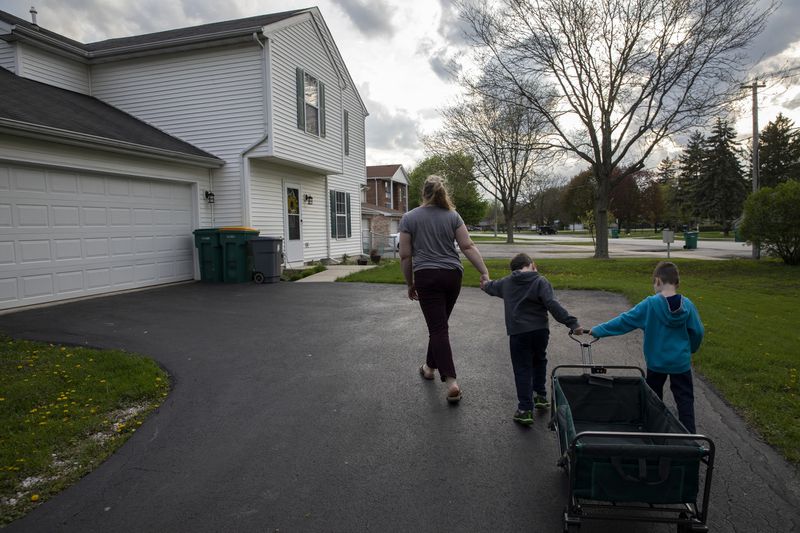2025 Conference Registration
Thank You for Joining Us!
"*" indicates required fields
Thank You for Joining Us!
"*" indicates required fields
"*" indicates required fields
"*" indicates required fields

Kate, her husband and their newborn twins rented a small one-story home north of downtown Naperville and quickly learned to appreciate the community and its amenities.
She attended New Covenant Church and grew close to new friends, some who would become the twins’ godparents. Over four years, she and her sons planted firm roots in the city. Naperville was home.
But in this high-end west suburb, one financial setback can mean you’re out. Melekhova’s twins were born with health issues and she divorced her husband to escape her troubled marriage. Moving costs and rent drained her savings. She now lives with her twins in another suburb, while most of her life – her friends and church – remains in Naperville.
Melekhova’s family and financial struggles could happen anywhere, and she is grateful for the community organizations that stepped in to help. But her plight is amplified by Naperville’s high housing costs.
“There (are) people like me, whose children were there, whose friends are there,” Melekhova said. “And I simply don’t have the ability (to live there).”

A state agency recently faulted Naperville as the only Illinois community of 50,000 or more lacking affordable housing, which, according to the federal government, means housing costs make up no more than 30% of a household’s income. In a report last year, the Illinois Housing Development Authority found just 7.5% of Naperville homes are considered affordable based on the regional median income, among the lowest percentages in the state.
Some elected officials fear Naperville’s high housing costs could drive out seniors and push away recent college graduates and middle-class professionals. As those city leaders consider a slew of new developments, they and housing advocates are debating how and whether to include affordable units that could bring in new residents and help people such as Melekhova stay.
Their decisions could shape Naperville’s makeup for decades to come.
Not enough affordable housing
Naperville is known for its high quality of living and good schools, but its affordable housing problem has been evident for years as well. In 2013, the Illinois Housing Development Authority found just 6.3% of the city’s housing was affordable.
Naperville itself acknowledged an “inadequate supply” of affordable housing in a 2017 study city officials are required to compile for the federal government.
Efforts to include affordable housing in Naperville developments have been met with some resistance. Residents have questioned the effects affordable units would have on their neighborhood and whether the look of buildings with affordable units would fit the character of the area.
One question submitted on a note card during a panel on affordable housing in May was more pointed: “What steps can landlords utilize to minimize the potential negative impacts of the associated tenants utilizing affordable housing?”
Discussions on affordable housing can quickly jump to federally subsidized housing, said Councilwoman Theresa Sullivan, calling it a euphemism for race.
“In my experience, it’s not blatant. It’s not explicit. But I certainly do feel like when affordable housing comes up people are quick to jump to (federally subsidized) housing,” she said.
Several city council members recently spoke in favor of creating more affordable housing and are willing to consider requirements that new developments include affordable options.
Council member Patrick Kelly said creating affordable housing would pose challenges, such as making the units financially viable for developers, in particular because property values in Naperville are high. And, as more developments are built, less land is available to create affordable housing, he said.
But one development that is to be built on city-owned land near downtown — the Fifth Avenue development, which is still in the early planning stages — offers an opportunity for the city to set an example with affordable housing, he said.
“Just having a diverse community in a lot of different ways — economically, racially, age, size of homes — just having people and kids exposed to different perspectives, and I think really makes them better suited to enter the world as they grow up, which has a huge amount of different perspectives,” he said.
Council member Patty Gustin, a real estate agent, took a more cautious approach. She called for clarity surrounding affordable housing.
“Many of the market-priced properties are not even attainable for those in mid-market pricing, so yes, I think the conversation has to be had,” she said. “Do I believe that we need to restrict commerce and make it whereby a certain percentage throughout the whole city has to be subsidized housing? … I don’t know if that’s what we want to do.”
For Melekhova, the debate is personal.
‘One medical crisis away from not being able to afford here’
Melekhova moved to Naperville in 2014 just after her twin sons were born, while the boys were still in the hospital, because she knew she would need to be closer to their medical care. She and her family rented a small house for $1,475 a month, she said.
She had spent weeks before the move at Northwestern Medicine Central DuPage Hospital with a difficult pregnancy. The boys were born about two months early, then faced feeding, respiratory and other health issues. They continue to see specialists.
While doctors monitored her during her pregnancy, she continued working from her hospital bed as a scheduler for a home health care agency, she said.
She eventually brought the boys home from the hospital, but she couldn’t care for newborn twins and work. She hardly remembers that time, surviving on maybe four hours of sleep a night and, mostly, coffee with sugar, she said.
One child had trouble eating and needed a special feeding tube. He was allergic to regular milk and required expensive formula, Melekhova said.

Meanwhile, her troubled marriage disintegrated.
Melekhova was left with few prospects. She had no money and no place to go with two young children. She also had to factor in her parents, who had come from Russia to help her but had no authorization to work in the United States.
Her church in Naperville became her support system. For a time, the church helped pay rent and bills. Members pitched in to help with her kids and visited Naperville’s Loaves and Fishes food pantry for her.
But that couldn’t be a long-term solution, former church deacon Paul Adams said.
“From my point of view, because it’s expensive to live in Naperville, it kind of keeps out people that can’t afford to live there,” Adams said. “And Kate, because of her great need with her kids, was willing to do whatever it took to keep her kids near some medical programs.”
In 2016, Melekhova turned to Bridge Communities, which runs transitional housing programs across DuPage County. Their largest housing campuses are in Naperville.
She was, at first, turned down from the program, in part because her family included her visiting parents. She found out with five days left in her rental home, in the parking lot outside her part-time job at T.J. Maxx.
“I listened to the voicemail, and I was in the parking lot crying because I didn’t know how to go home and what to do,” Melekhova said. “I mean, what should I tell my family?”

She appealed to the organization and Bridge soon accepted her, and a Naperville Rotary Club helped sponsor her family. Her parents returned to Russia and she completed the two-year program.
But as she was coming out of the program, she was in a tough position, Adams said. She was making too much money to qualify for state or federal help, but too little to support her family.
“If Habitat for Humanity hadn’t have offered her a place in their program, I don’t see how she would have made it,” Adams said. “Except for, you know, just maybe move to a totally different area where housing was way cheaper, or out of state, or something. I don’t know.”
Naperville needs more options for residents facing circumstances like Melekhova’s, said Michele Clemen, former chairwoman of Naperville’s Housing Advisory Commission.
The issue has come to the forefront in recent years in Naperville — as it has in communities across the area — as the city looks to make sure teachers, nurses, restaurant servers and city employees can afford to live where they work, she said.
“Quite honestly, anyone who lives in Naperville and is able to afford it is probably only one medical crisis away from not being able to afford here,” she said.
The Bridge program helped Melekhova find her current job with a second-chance auto auction. The job helps pay the bills and her managers are flexible when she needs to care for her children, who are often sick, but time off for the boys cuts into her hourly salary. She said she could never afford property taxes in Naperville, where the median home value in 2017 was $410,000.
In the Chicago metro area, an affordable home purchase price for a three-person family such as Melekhova’s was considered $169,306 in 2018, according to the Illinois Housing Development Authority.
Melekhova was accepted into Habitat for Humanity as she left Bridge but the program, also, couldn’t find a home for her in Naperville, she said. The organization instead came up with her current home, a two-story duplex in Westmont, which is between Naperville and her job in Oak Brook, she said. She moved there in November.
It’s not an unusual situation for the organization, said Dave Neary, executive director of DuPage Habitat for Humanity. Naperville has one Habitat house built years ago that was donated, and the organization helps with home repairs in the city for low-income owners, he said.
“That’s the whole thing,” he said. “The houses become unaffordable for people, in general, to move in, and it’s impossible to build there without some level of political will.”
In the meantime Melekhova is settling into her new home.
Her friends in Naperville helped her move into the duplex, where the boys have space to romp and tumble between the couch and the TV, next to the donated coffee table, which is oval so they won’t bang into any sharp corners. On a recent afternoon, the twins stopped crashing around long enough to settle down in front of a movie, until Melekhova forced them to change it to something that wasn’t “intellectual garbage.” They’ve already visited the police station and firehouse to introduce the twins to their new community.
Still, she would see her friends and one of the twins’ godparents more often if they lived in Naperville. She can’t always pack up the twins in time to make it to her Naperville church on Sundays. A church member brings her groceries from Loaves and Fishes.
Melekhova’s new home brings stability, which is important for her children, she said. They are part of the same community as their classmates and staying in one place will be good for their health and education, Melekhova said.
In a perfect world, she would pick it up and move it to Naperville.
This is the first of three Naperville Sun stories on affordable housing in Naperville.

